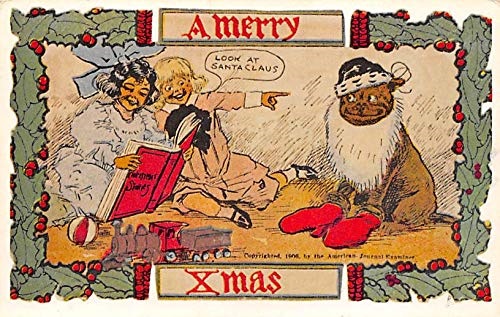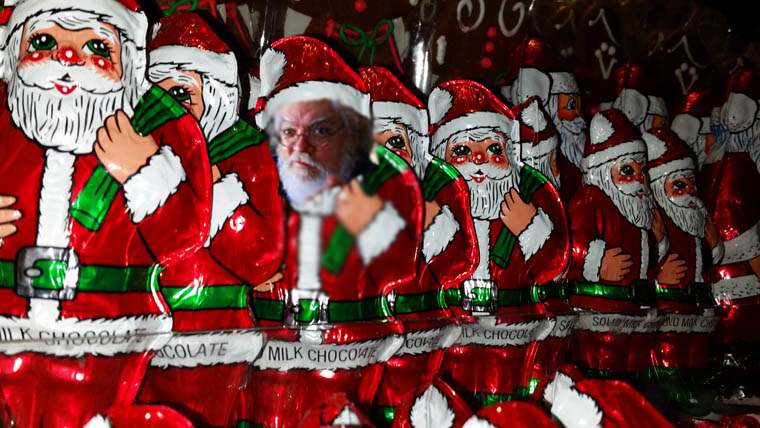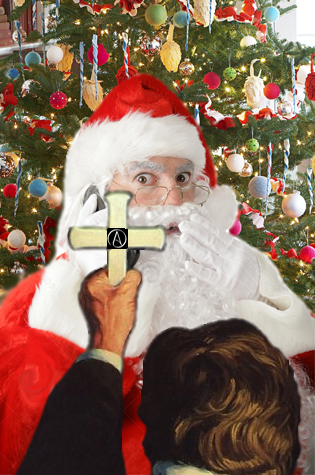As I write, the town Christmas Parade is merrily proceeding through the streets. I can’t describe it to you because I’ve never attended it, but I’m glad they have it. I love Christmas and rejoice to celebrate it. I have never put it aside as childish or as religious. All my time in the Freethought movement and Secular Humanism I was never a Christmas denier. I knew with the logic of Bugs Bunny, a trusted guide since childhood (before I grew up and got stupid), that, if I ever found myself in a position requiring me to stop celebrating Christmas, I must have “made a wrong turn in Albuquerque.†I figured that my nonbelieving colleagues and compatriots might be more consistent, but that consistency might turn out to be the hobgoblin of little minds.
The atheist opposition to Christmas, at least the atheist’s resolution not to celebrate it, stems from their quite natural antipathy for the literal meaning of the Christian Christmas: the celebration of the Incarnation of God in Jesus Christ for the purpose of redeeming the world from sin, a package of doctrines which, if understood literally, is just what Bultmann said it was: “Surely this is primitive mythology.†Bultmann, a Lutheran, tried to “demythologize†these doctrines, seeing in them an ancient expression of existential freedom gained by repeating Jesus’ full commitment of his future to God. Nice try, but I find that unconvincing and unhelpful. I will not defend a non-literal celebration of the holiday on that basis. It sounds to me like contrived excuse-making for enjoying a holiday you feel guilty for observing since you have no more reason to do so.
Anti-Christmas atheists are, I think, taking the religious meaning of Christmas more seriously than Christian believers do! It is just like fundamentalists who oppose Halloween because they take the devil, witch, ghost, monster business much more seriously than their children do, who are wise enough not to confuse fantasy and reality.
But Christmas need by no means be an exclusively Christian holiday. All who celebrate it, whether they are Christians or not, are celebrating values including family sentiment, generosity, winter coziness, and adult enjoyment of childhood delight. “Christians or not� Yes, of course. Very many secularists, Jews, even Buddhists in Japan, love Christmas. They realize it does not suffer without a focus on Christian soteriology.
The holiday has evolved. As far as we know, it originated as the observation of the Winter Solstice, the rebirthday of the sun god Mithras. It was probably Christianized in the fourth century after the Council of Nicea decided that Jesus Christ was God incarnated, which made it advisable for Christians to choose a date for his birth so they could celebrate the central datum of Christian salvation. They seem to have chosen December 25 since people were already celebrating Mithras’s rebirth on that date, which was called Brumalia (the eighth day of the Saturnalia Festival). They wanted a Christian alternative to those rowdy Brumalia office parties.
Christmas continues to evolve. Conservative Christians loudly bemoan the fact that Santa Clause has long threatened to usurp Jesus as “the reason for the season.†I think Charles Dickens created another effective rival to Jesus, namely, of course, Ebenezer Scrooge, the repentant skinflint. Christians complain of the “secularization of Christmas.†Many of our favorite Christmas songs make no mention of Christ, or even of Christmas, though they are played only during that time of year: “Baby, It’s Cold Outside,†“Winter Wonder Land,†“Frosty the Snow Man,†“Let It Snow,†etc. And here’s the irony: if Christmas is indeed becoming secularized, why should secularists repudiate it? Christmas is a Christmas gift to you!
You know you want it! That’s why you keep creating cheap knock-offs like “Winter Holiday,†“Festivus,†and “Humanlight.†You’re not fooling anyone but yourself! Here, have some egg nog.
So Says Zarathustra.



